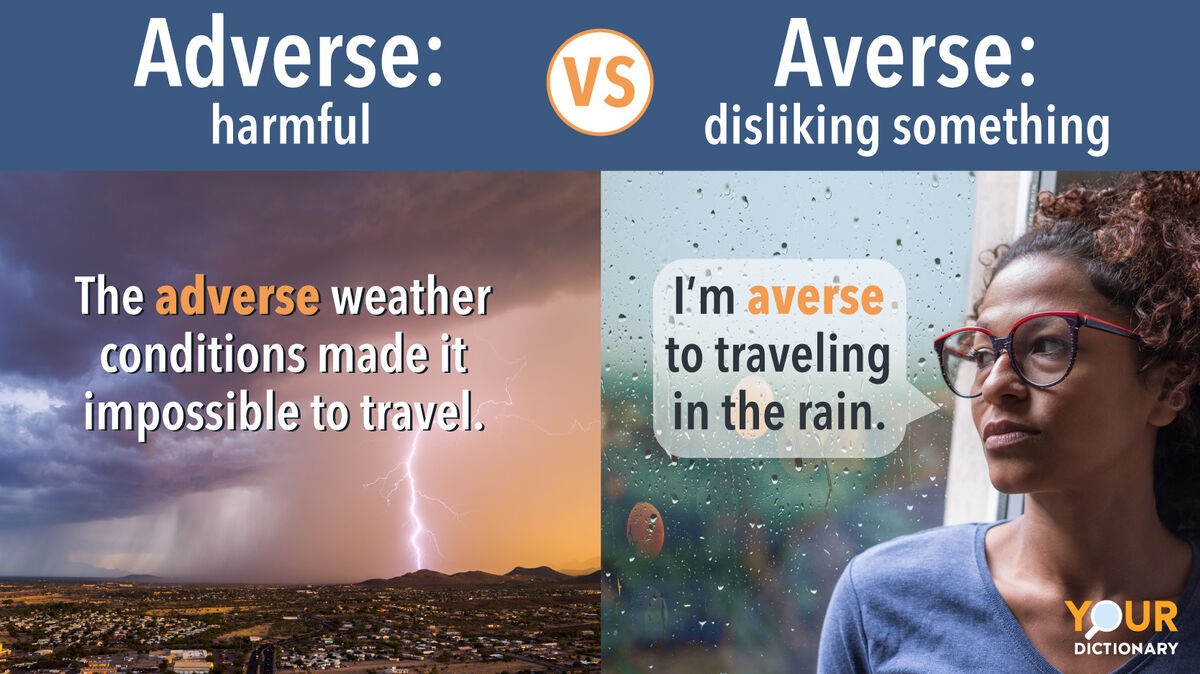
Can you use the words adverse and averse interchangeably? The answer is no — adverse and averse have different spellings, different pronunciations and different meanings. The trick is knowing the context to use each word properly.
The Difference Between Adverse and Averse
The words adverse and averse come from the Latin root vert-, meaning "to turn." But their similarities end when it comes to their meanings.
Word | Meaning | What Does it Describe? |
| adverse | unfavorable or harmful | objects, effects and situations |
| averse | not liking something | people and feelings |
The difference between adverse and averse lies in their prefixes. The prefix ad- means "toward," indicating that an adverse situation is bringing danger toward you. However, the prefix a- means "away," making averse the act of turning away from something.
An Easy Way to Tell Averse and Adverse Apart
If you're struggling with the difference between these similar-sounding words, try out these tricks.
- Remember the word bad. It has the letters "ad," just like adverse.
- Think of the word aversion. When you're averse to something, you have an aversion to it.
When to Use Adverse
The adjective adverse typically describes things or situations. You would not describe a person as adverse, no matter how annoying they are!
Examples of adverse (and its adverb form, adversely) in a sentence include:
- This medication can have adverse effects on your blood pressure.
- The hurricane is bringing adverse weather conditions to the coastal states.
- Joni had an adverse reaction to the bee sting.
- If you sell your stocks, it may adversely affect the stock market.
- Punishing the whole class instead of one student can be an adverse experience for everyone.
When to Use Averse
You use averse when you're describing a person's negative reaction to something. For example:
- I'm averse to having another meeting about this issue.
- We're not averse to moving out of state.
- The baby is strongly averse to creamed spinach.
- Voters are averse to hearing the truth about their favorite candidate.
- Lara isn't averse to saying no when people ask her to do their homework.
Noun Forms: Adversity vs. Aversion
If you feel that using adverse and averse makes your writing sound a bit pedantic, try their noun forms instead. Using adversity and aversion gets the point across in the same way, and they're harder to mix up as well. For example:
- Claudia was raised in adversity, but she used those hardships to become a stronger person.
- Our city faced adversity after the devastating wildfire.
- My dog hates the Fourth of July because of his aversion to firework noises.
- My sister has an aversion to scary movies.
Don't Be Averse to Improving Your Vocabulary
Have you had an aversion or two when it comes to grammar and vocabulary? Don't worry — mastering language arts doesn't need to be an adverse experience! Now that you've figured out the difference between adverse and averse, try learning more about allude vs. elude.